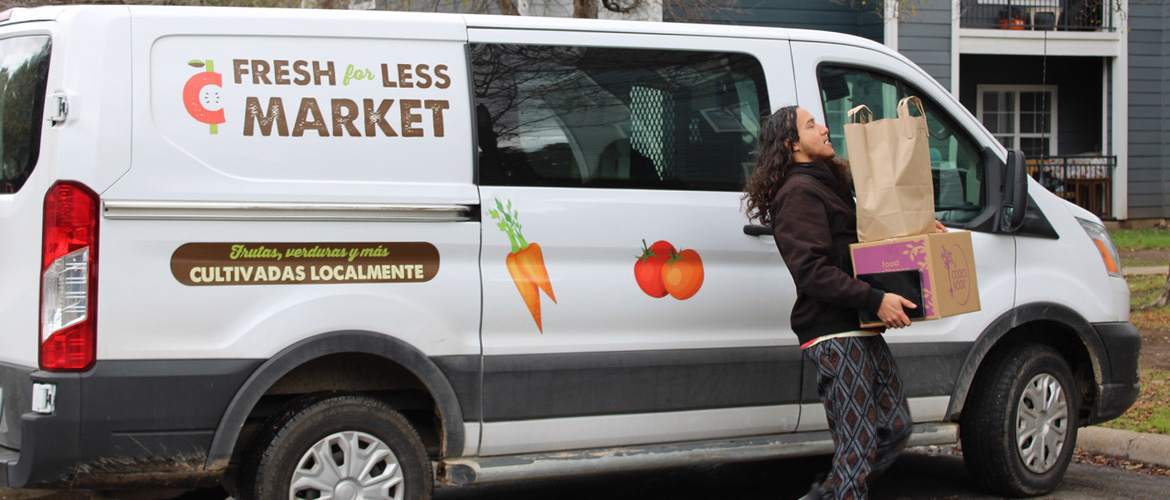Some women giving birth at Ascension Seton Medical Center in Austin are leaving the hospital enrolled in a program that delivers nutritious meal kits, produce and pantry items to their homes.
The deliveries come from the Food is the Best Medicine program — a collaboration involving a health care provider, nonprofit farm, research institution and food-based, social impact business to improve health outcomes for moms and babies.
“We needed to do something about the alarming rate of maternal and infant deaths in the Austin area,” says Elizabeth Polinard, a founder and chair of the Ascension Texas Council on Racial and Health Equity. “One of the first things the council wanted to focus on was the impact of food insecurity on maternal health.”
Pregnant patients are invited to participate in the program after they are identified as being food insecure. Goals include increasing participants’ food security and breastfeeding rates, as well as improving their diets, home-cooking rates and mental health.
A $20,000 Blue Impact℠ grant from Blue Cross and Blue Shield of Texas is helping the program deliver the food, as well as provide nutrition education and information about community food resources.
Researchers at the Michael and Susan Dell Center for Healthy Living at UTHealth Houston School of Public Health are collecting data to determine whether the program is making a difference in 25 of the most underserved ZIP codes in Austin and Travis County.
Since launching, the program has enrolled about 240 moms and delivered more than 13,500 pounds of food. Many participants reported eating more fruits and vegetables, and their rate of preparing home-cooked meals increased nearly 40%.
Nearly all participants said the program helped them save money on groceries. The results appear to be lasting. Rates of food security among participants reached 35% by the end of the program.
“The whole idea is to be innovative in how we distribute food to address health disparities,” says Joi Chevalier, founder and CEO of The Cook’s Nook, a meal preparation company involved in the effort. “The response to this program has been overwhelmingly positive.”
Statewide, rates of pregnancy or childbirth deaths surged in 2020 and 2021, according to the state’s most recent maternal mortality and morbidity review report. Black women were about 2.5 times more likely to die from pregnancy and childbirth than white women. And in most cases, the mothers’ deaths could have been prevented.
Meantime, Texas has the nation’s second-highest food insecurity rate, the U.S. Department of Agriculture found. In Austin, known for its affluence and a booming technology industry, roughly 19% of the city’s population doesn’t have enough food to eat, data from the hunger-relief organization Feeding America® indicates. More than 12% of residents live in poverty, U.S. Census data shows.
Of the Food is the Best Medicine participants, at least 70% have been Hispanic and Spanish speakers. Most live in poverty in households with at least two adults and other children.
“Access to nutritious food can keep people from getting seriously ill,” says Victoria Threadgould, Ascension Seton Foundation’s senior director of grants and development. “But there are so many other challenges these families are facing.”
Throughout the program, postpartum participants are surveyed about their physical, emotional and mental health and the effects of food insecurity. Families also are connected to other resources, including SNAP and WIC, to help mitigate food security concerns after the program ends.
“The Food is the Best Medicine program has gotten a fair amount of attention,” says Polinard, adding that professional peers, including those at sister Ascension facilities, have expressed interested in replicating it in their communities to address health inequities. “They ask, ‘When is this coming to my site?’”
With the Blue Impact grant program, BCBSTX awarded 101 Texas nonprofits $2.9 million in 2024. The program invests in organizations working to address social and economic drivers of health, including nutrition.
“For more than 95 years, BCBSTX has forged alliances with private and public organizations to honor our commitment to improve the health of Texans,” says Patty Escoe, BCBSTX vice president of operations. “Our targeted grants are one of the many ways we assist community partners with supporting the needs of underchampioned populations in all communities.”
As UTHealth collects data on the Food is the Best Medicine program, members of the partnership routinely discuss whether the program could be lengthened, expanded or diversified. How can it become more cost-effective and sustainable? Could the model become an evidence-based standard of medical care?
“There are moms in need and wanting some assistance,” Threadgould says. “Without this program, they would get discharged after giving birth and we wouldn’t know whether they had food at home for themselves or their families.”

